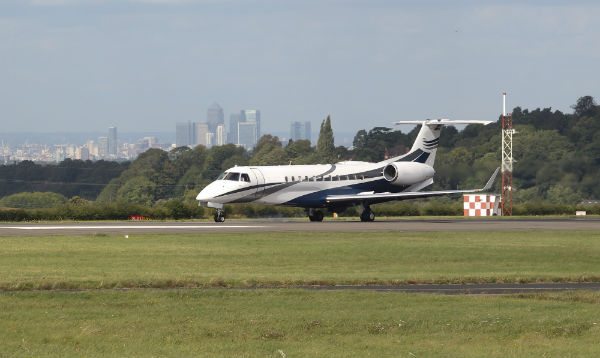London airports fail to benefit from Olympics bonanza

Every airport around London had empty space for private jets during the Olympics, despite predictions that they would be virtually bursting at the seams.
Fifteen days were all that separated the ceremonies bookmarking the London Olympics, but despite this, the build-up was still riddled with speculation surrounding the event’s long-term effect upon UK business aviation.
When the UK CAA announced that virtually every airport in the south of England would be slot-controlled from 14 July – 15 August and fed by a new airspace structure, worries soon began to arise. There were concerns that London may not have the infrastructure to cope with the influx of traffic. It was argued that the booking system would disrupt the quick and fuss-free nature of business aviation, and some claimed that airports and operators could stand to permanently lose the custom of regular clients grounded by the restrictions in place.
Less than 20 miles from the centre of London and just outside of the restricted zone, London Biggin Hill Airport was perfectly situated to deal with additional arrivals. Granted 21 slots per hour, Biggin Hill’s pre-Olympics briefing in April was dominated by the question of whether the airport would be able to cope with the demand or be forced to send aircraft elsewhere. Assurances from business development manager Robert Walters were that the airport could not be any better prepared, but that the expectation of last minute bookings meant that few guarantees could be made.
Three months later, on the afternoon of the Olympic opening ceremony, Walters stood on the famous runway surveying the half empty airport. “People are still calling up to ask if there is any space left in London,” he said. “I think there is tonnes.”
A total of 75 business aircraft were welcomed over the course of the day, it was later confirmed; a step-up from the “relatively quiet” week beforehand, but still some way off the airport’s 150 capacity. Elsewhere, Cambridge Airport saw a total of 17 aircraft movements on the same day, London Oxford Airport announced a 63 per cent increase in what is normally a quiet period and TAG Farnborough Airport said it had been “a particularly eventful period, with the Farnborough International Airshow ending just 12 days before the Olympic Games opening ceremony.”
At Biggin Hill, the airport had shown early signs of encouragement by welcoming ten new operators for the first time in the week leading up to the Olympics, but Walters later revealed that an Austrian operator had booked 150 slots in
advance of the Games without using a single one.
The reason for the underwhelming numbers, Walters speculated, was largely down to the “misconception” that the Olympics would create havoc for the airports in and around London. “If you are a foreign operator and you see a wodge of paper telling you that you cannot fly into London, it is quite daunting,” he said. “We have had cancellations. There have been some major US corporates who have not turned up. They do not give a reason – it’s just business.”
Andrew Walters, chairman of Biggin Hill Airport, was pleased with the competency the airport had shown when dealing with an increase in usual traffic levels, but claimed that the Olympics had not been the “business bonanza” that many had predicted. For this reason, he expressed his disappointment that smaller operators had been unable to capitalise upon the opportunity.
One of the more vocal industry figures in the build-up to the Olympics was Michael Hampton, managing director of Capital Air Services, a helicopter operator with bases in Oxford, London, Cambridge and Manchester. As Hampton relies heavily on taxiing his clients into the City, the restrictions caused major concerns for business. “It is not going to be good for us,” he said, stressing his worry that some of his customers could be put off permanently by the disturbances.
“I’m sure we did lose business,” he says, now able to reflect upon the Games. “In fact, looking at the figures, I can see we did.” Speaking from his London Oxford Airport office on the day the air restrictions are due to be lifted, the sense of the relief in Hampton’s voice is tangible. “There was always a concern that when we put the restrictions into place, we would never get rid of them,” he says. “Thankfully, that hasn’t happened.”
Biggin Hill claimed to encounter no problems with the ACL slot system. Between 21 July and 15 August, a total of 1300 slots were taken, and throughout July, the airport saw business aviation grow by 12.5 per cent in comparison with the previous year. Beyond Biggin, data from PrivateFly.com has since confirmed that private jet movements throughout the Olympics were around 25 per cent less than predictions had suggested, and in fact, the booking service had seen a 40 per cent increase in bookings as a result of Londoners fleeing the capital. The company also confirmed that all London airports, including London City Airport, located minutes from the Olympic Park, had space leftover for private jets.
In stark contrast, just two years before, South Africa had found itself so inundated with business jets whilst hosting the 2010 FIFA World Cup that the Durban King Shaka International Airport had to re-open its old site, located 40 miles from the new airport, to cope with the overflow of traffic.
“It was a disappointment,” says Hampton, in response to the Olympics. “But I think most people realised the period was going to be disruptive.” When asked if he stands by his prediction that the Games could haunt the helicopter business for years to come, he is a little more optimistic than before. “We won’t know until our clients stop calling us,” he says. “But I think we are going to be alright.”









